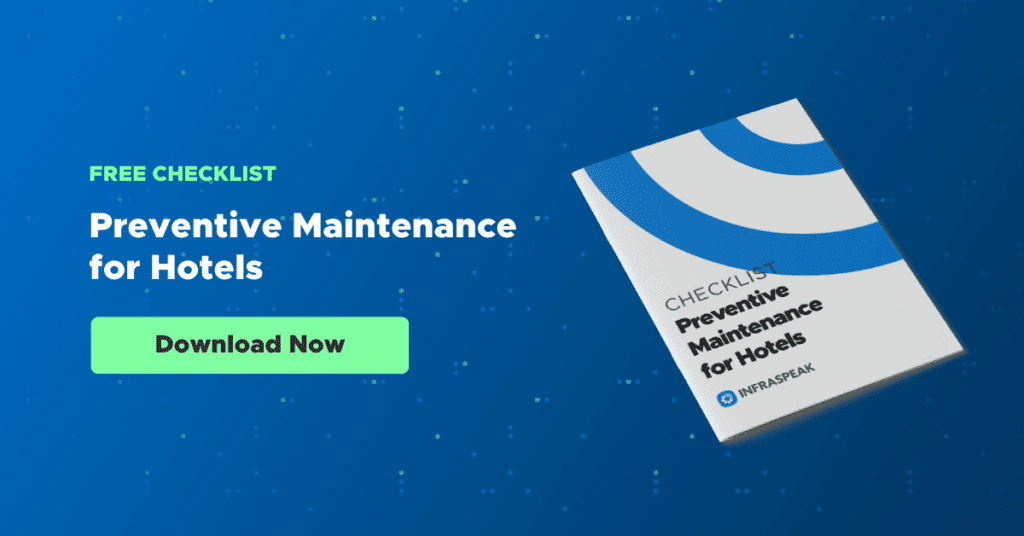The hotel industry is suffering a global shortage of professionals. In Brazil there are talks of a “manpower blackout”. In the UK, the industry’s problems were laid bare after Brexit and COVID-19. In Spain, despite there being more than 3 million unemployed, there is a shortage of cooks and cleaning staff. In the United States, the New York Times highlighted the lack of cleaning professionals as early as 2019.
Under the guise of sustainability, hotels have begun to encourage guests to waive daily room cleaning or towel changes. While many of these measures have a real environmental impact, the cost is more decisive: fewer rooms to clean, fewer hours of housekeeping.
Housekeeping and guest loyalty: directly proportional
But to what extent can you dispense with daily cleaning, changing towels, or deep cleaning certain areas of the hotel? Cleanliness is the most important factor in the choice of 78% of guests. It makes sense: nobody goes on holiday to deal with stained sheets, dirty bathrooms, or rooms with a dubious smell. Faced with these scenarios, 71%, 69%, and 65%, respectively, would walk out.
On top of this, there is the need to adjust guest expectations in the post-COVID world. A 2021 study found that over 93% of respondents expect every hotel to introduce its own safety measures. The top concerns were the cleanliness of lifts and rooms; followed by doors, gyms, and the hotel restaurant.
In addition, guests also seem concerned about occupancy limits and use of touchless technology. The study concludes that guest loyalty, and consequently the hotel industry’s upturn, depends on “safety, trust, and transparency”. In turn, these depend in equal measure on cleanliness and communication.
So, what solution do we propose? Not one, but several. Here are 15 ways to increase the productivity of your housekeeping team.
15 ways to increase housekeeping efficiency
1. Use and abuse of checklists
We know that having a written, standardised process reduces error to 5%. When that process is associated with a checklist, this error percentage is reduced to just 1%.
If we extrapolate this to housekeeping, we guarantee that only benefits will come from the use of detailed checklists for the cleaning of each room. Include all the points that need to be cleaned and/or checked, and a list of everything that needs replacing.
2. Don’t use a random order on checklists
Do you know that feeling of walking around the supermarket with your shopping list in hand, running back and forth? This happens to you because you’ve already passed the refrigerated aisle but forgot to pick up the butter.
Maybe, at some point, you even abandon the list and only notice when you get home that you forgot the yoghourts. It happens. So, you have to think that each floor is like the supermarket. To make sure nothing is forgotten, prepare the checklists with the map in mind and in a circular fashion.
3. Adjust the tasks to the guest’s needs
Many hotels allocate the same amount of time to every room. However, your task planning will run smoother if you make adjustments according to your guest’s needs.
In theory, a room with an extra bed or a cot will take longer to clean than a room that has only been occupied one night by one person. If you make these adjustments, staff will feel less pressured to clean everything in record time and your customers will be happier.
4. Integrate maintenance with property management
But how can you adjust each task to the guest’s needs? By integrating your maintenance platform with your PMS. So, every time you have a booking, you generate an automatic work order.
On average, it takes 30% longer to clean a room before check-in. The checklist is different and so is the stock expenditure, as you need to replenish toiletries and cosmetic products, for example. Wouldn’t it be nice if the work order mirrored this reality?
5. Still on property management: know the status of each room
The integration between maintenance and property management has another advantage: knowing the status of each room. For example, when a guest checks-out, housekeeping already knows that it can clean that room.
And it works both ways. When the team marks a work order as completed, the status of the room becomes “available” again and reception already knows it is ready to receive new guests. Communication flows easily and always in real time.
6. Automatically deduct inventory
It’s all too easy to lose track of how many toilet rolls, shampoos, shower gel, soaps, and sheets you spend each day. But with the right technology, this doesn’t even have to be a concern for your staff.
If you record the material needed for each work order, the quantities will automatically be deducted from your inventory without your staff having to do anything. In addition, you can configure the platform to trigger a notification when you reach minimum levels.
7. Simplify failure reporting
Housekeeping staff are in a prime position to spot problems: controls not working, broken blinds, clogged toilets. The question is: how can they report these failures?
If fault reporting is a bureaucratic process, your team will lose precious minutes. On the contrary, if you can easily report failures through the app they already use, your maintenance team will be much more efficient.
💡 Extra tip: integrate your maintenance platform with a chatbot, so guests can report breakdowns by message. The message turns into a work order and when your housekeeping and maintenance team go to the room, they won’t forget to fix the malfunction!
8. Choose your cleaning products carefully
To save on materials, you may end up spending more time on cleaning. Not all professional cleaning products have the same action method, and it’s always good to compare several options.
Assess how long the product takes to actuate (do cleaners have to wait a few minutes?). What is its method of action (does it interact with grease or water?). Do you need to use hot water or extra materials? What is the concentration of the chemical? Are there other options for routine cleaning?
9. Organise the floor workers’ trolley carefully
The trolley needs to carry all the materials so that time isn’t wasted going back and forth. But it also can’t be so full that it’s difficult to push and manipulate.
The wheels need to be multi-directional and have brakes. Place the hygiene products on top of the trolley. Sheets and towels, which are heavier, are folded on shelves underneath. Dirty laundry goes in a separate bag and, ideally, there is still somewhere to hold the hoover to save time.
10. Lean on data to create predictability
Lean on data analysis to uncover trends. Which rooms take longer to clean? On which days do you have fewer check-ins and need less staff? Can you plan stock purchases based on stays?
Chances are you already have an answer to these questions based on intuition. However, be sure to analyse the data to choose dates for deep cleaning (for example, cleaning refrigeration equipment, spas, and other common spaces), staff time off, and distribution of tasks.
11. Learn more about pests’ life cycle
Hotels are vulnerable to pests of ants, bedbugs, cockroaches, moths, and flies. Knowing the life cycle of each one allows you to do proper preventative maintenance, rather than doing chores in vain.
For example, it’s not enough to vacuum vigorously or wash your bedding repeatedly at high temperatures. Instead, you need to look for holes and cracks in the wood, use metal laundry trolleys and leave them at the entrance of the room (to prevent pests from spreading).
12. Invest in staff training
The previous point brings us to staff training. The training you offer during onboarding is essential for the person to learn how to perform their duties and know how to comply with hygiene and safety standards.
However, offering more training allows staff to become increasingly efficient and even sub-specialised. You can offer specific training for clothes handling, cleaning spas and wellness centres, sterilising and disinfecting spaces, cleaning windows and facades, for example.
13. Increase efficiency in the laundry
Between sheets, towels, and napkins, hotels always have tons of laundry to wash. So, it’s worth checking the condition of your laundry equipment.
Make sure washing machines, dryers, and ironing systems are in good condition and efficient. But, if staff know their products well, you can also reduce washes and save time. It is useful, for example, to know how to use emulsifiers to remove grease from spa products and cosmetics.
14. How much time is spent vacuuming?
In a hotel, you have to vacuum everything: from the common rooms to the furniture. Do you have any idea how much time your housekeeping team spends vacuuming? And isn’t it possible to reduce this time?
Bag hoovers, bagless hoovers, upright hoovers, water hoovers, hoovers for solids, hoovers for solids and liquids, hoovers for hard floors, etc. Those that clean solids and liquids save time when cleaning restaurants, bars, and breakfast rooms, for example. Check here for a complete guide.
15. Keep your team motivated
They say that winning a new customer is 25 times more expensive than retaining a customer you already have. What if the same is true for your staff? When retaining talent, you don’t have to keep recruiting and coaching trainees.
We know that people who are satisfied with their workplace and working conditions are less likely to leave and are also more productive. So here are six strategies to boost talent retention:
- Decent pay and an employment contract that is not precarious, since low wages are one of the main complaints in relation to the tourism sector;
- Training, which we have already talked about above, because it represents an opportunity to learn new things and also to grow professionally;
- Pay attention to feedback, because “feeling heard” increases self-esteem. Ask them for their ideas and try to implement them, and get the team together before shifts, for example;
- Flexible working hours, as far as possible. One suggestion from UK experts is to use an app where employees can swap shifts with each other;
- Set clear and transparent goals, so your team understands the impact it has on customer satisfaction. When there is positive feedback, share it;
- Offer a bonus when objectives are met. There is nothing better than the feeling of a job well done.
Productivity always comes from a union of people (your team), processes (the way you organise housekeeping), and technology. With these 15 tips, you will create a much more harmonious union.
If you need us, remember that the Infraspeak platform integrates with various PMS and automatically deducts stocks, as well as having its own Housekeeping app. Housekeeper centralises information from check-ins and check-outs, lets you know the status of each room at any time, and puts an end to the shuttle of errands and calls between reception and housekeeping.


